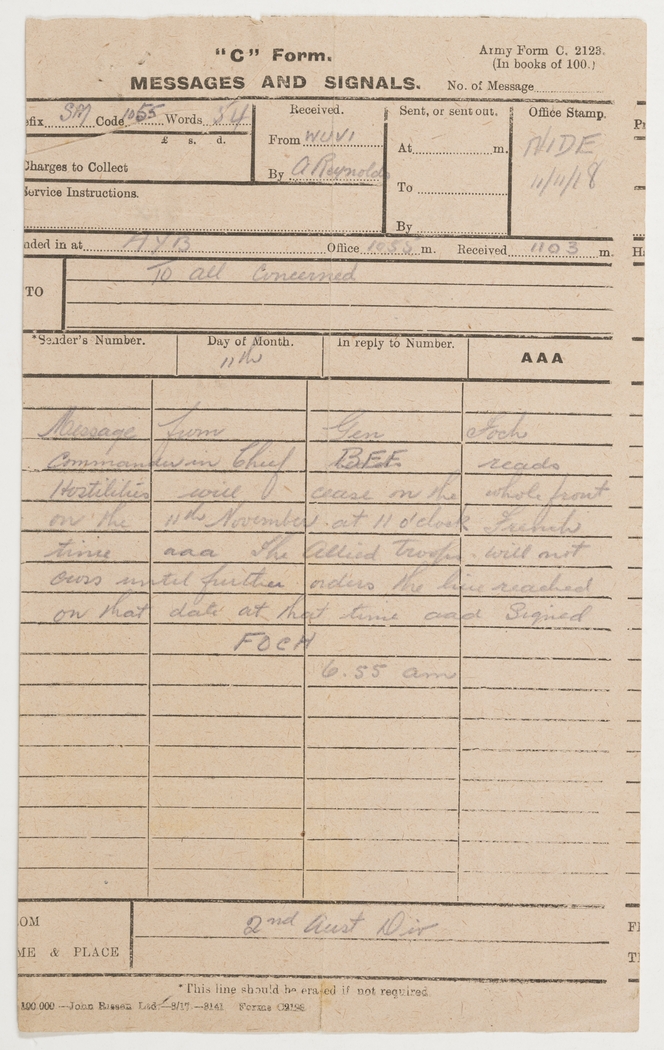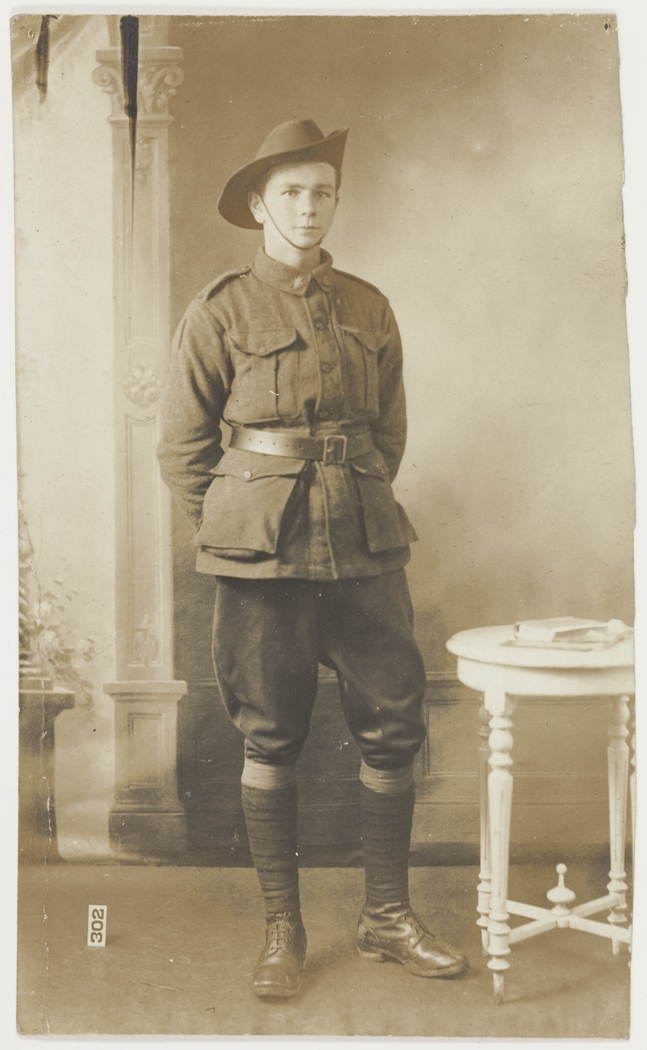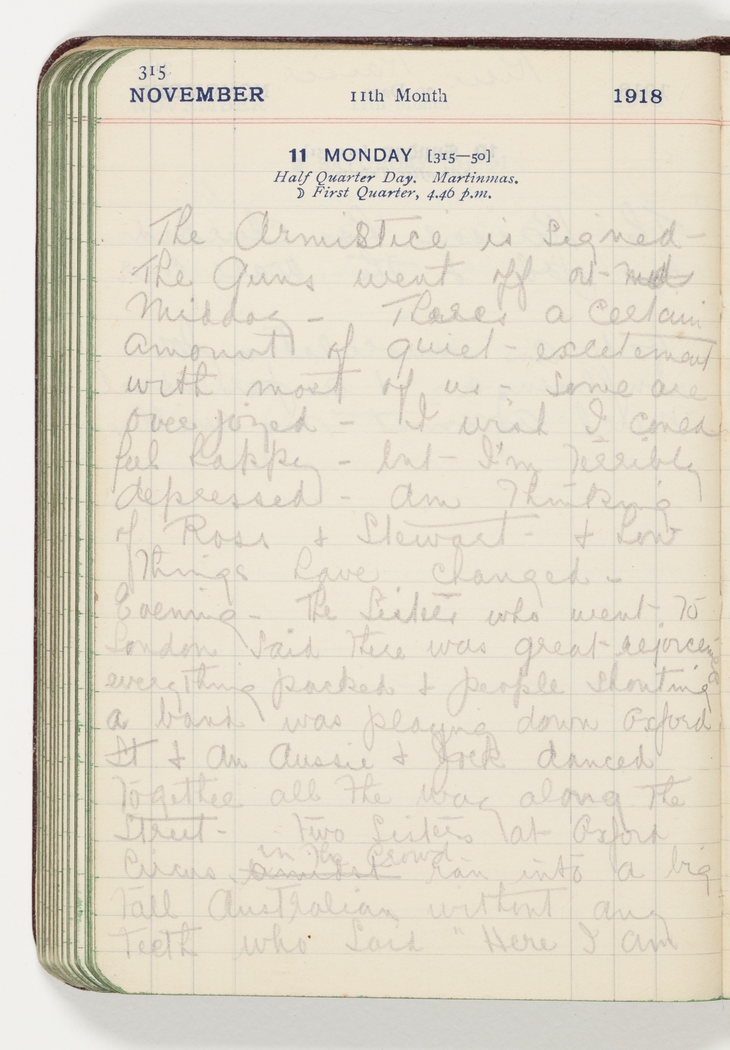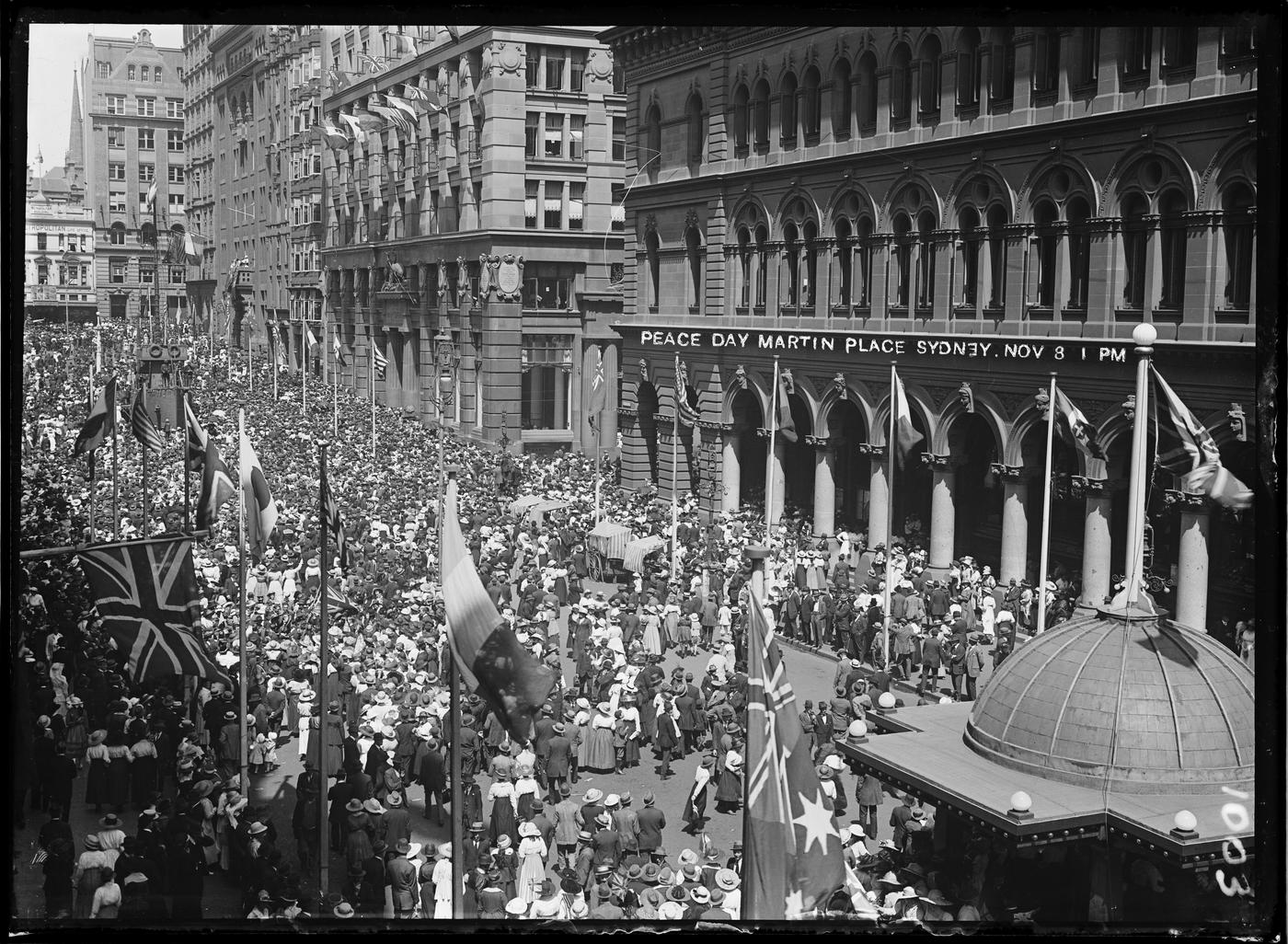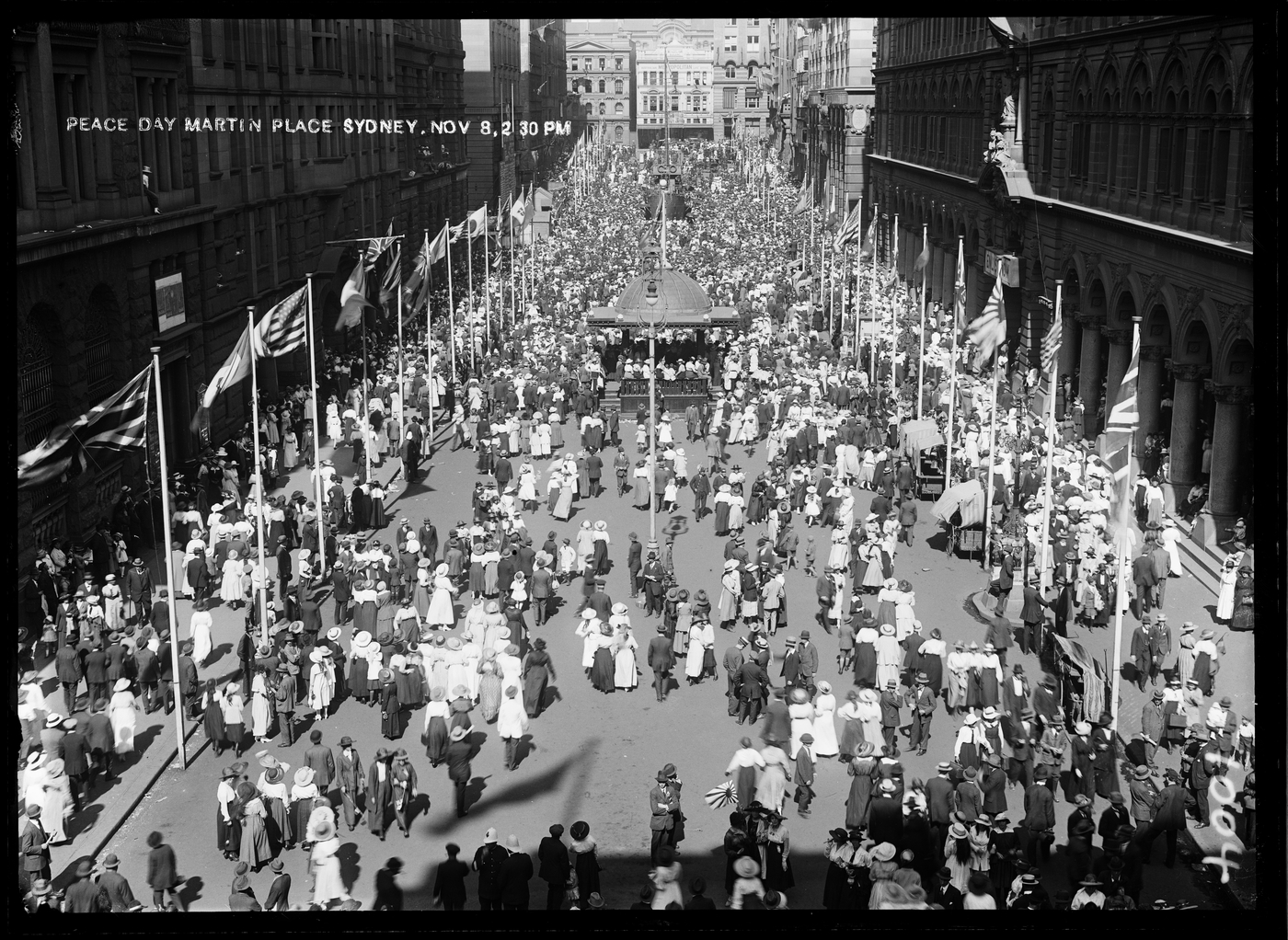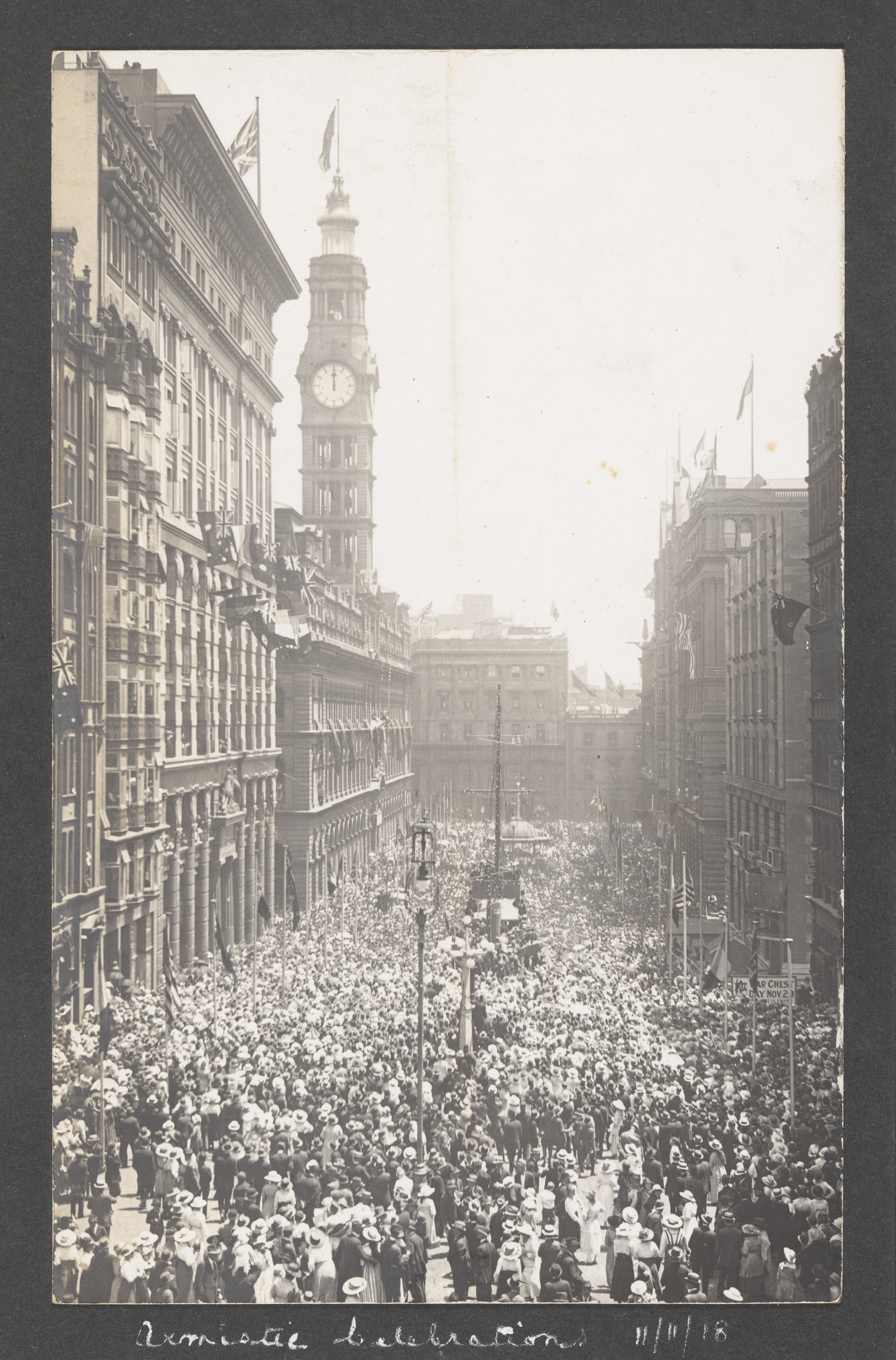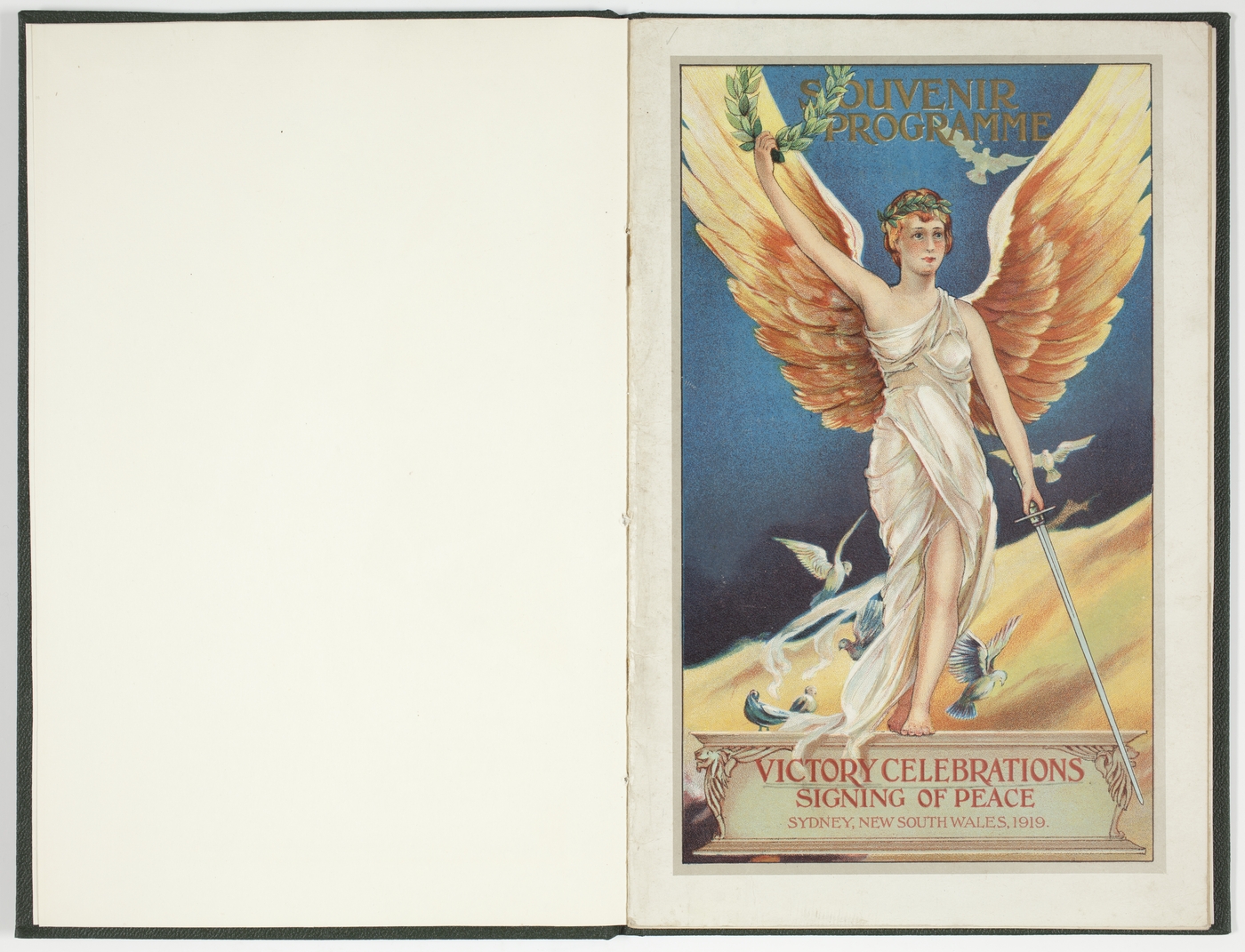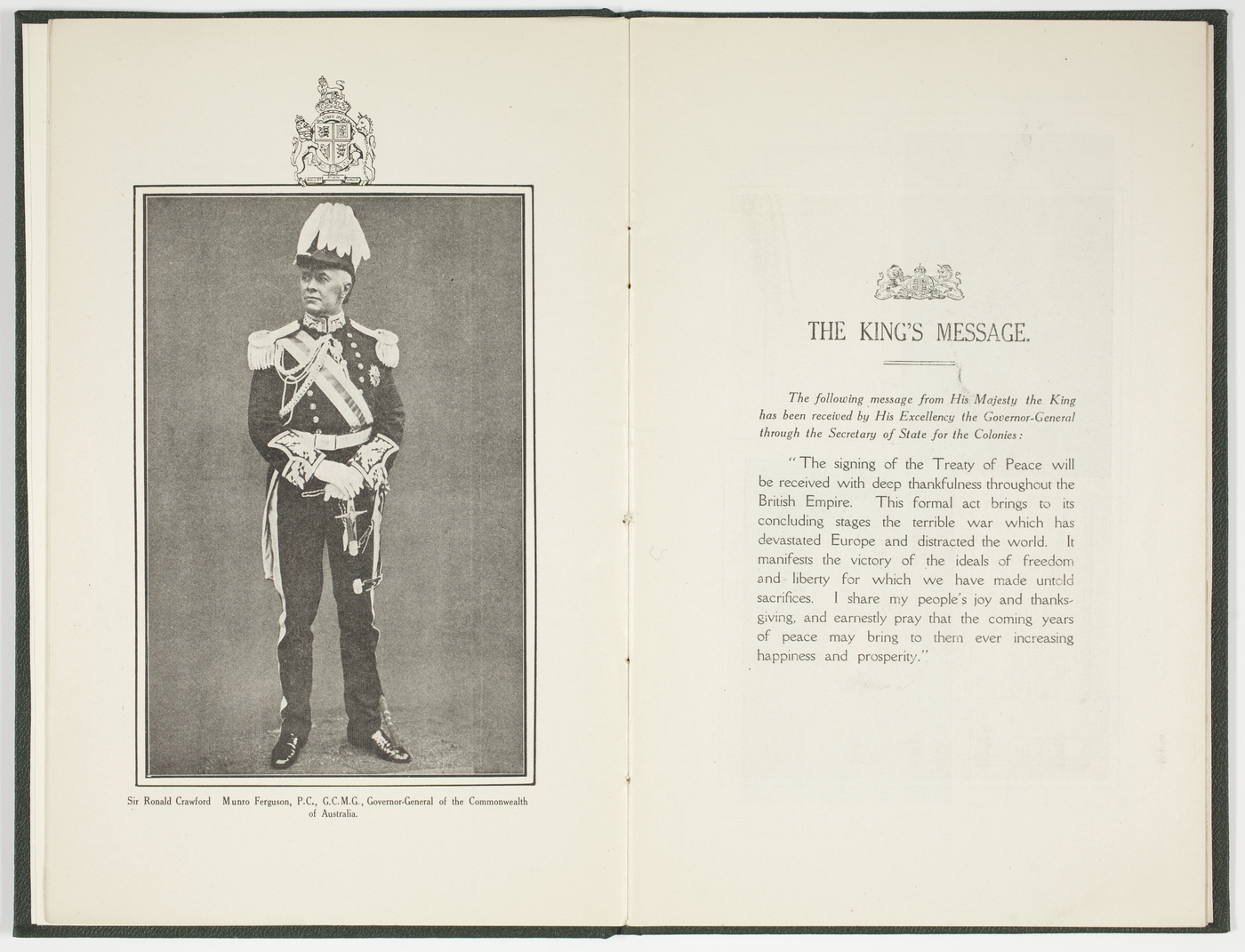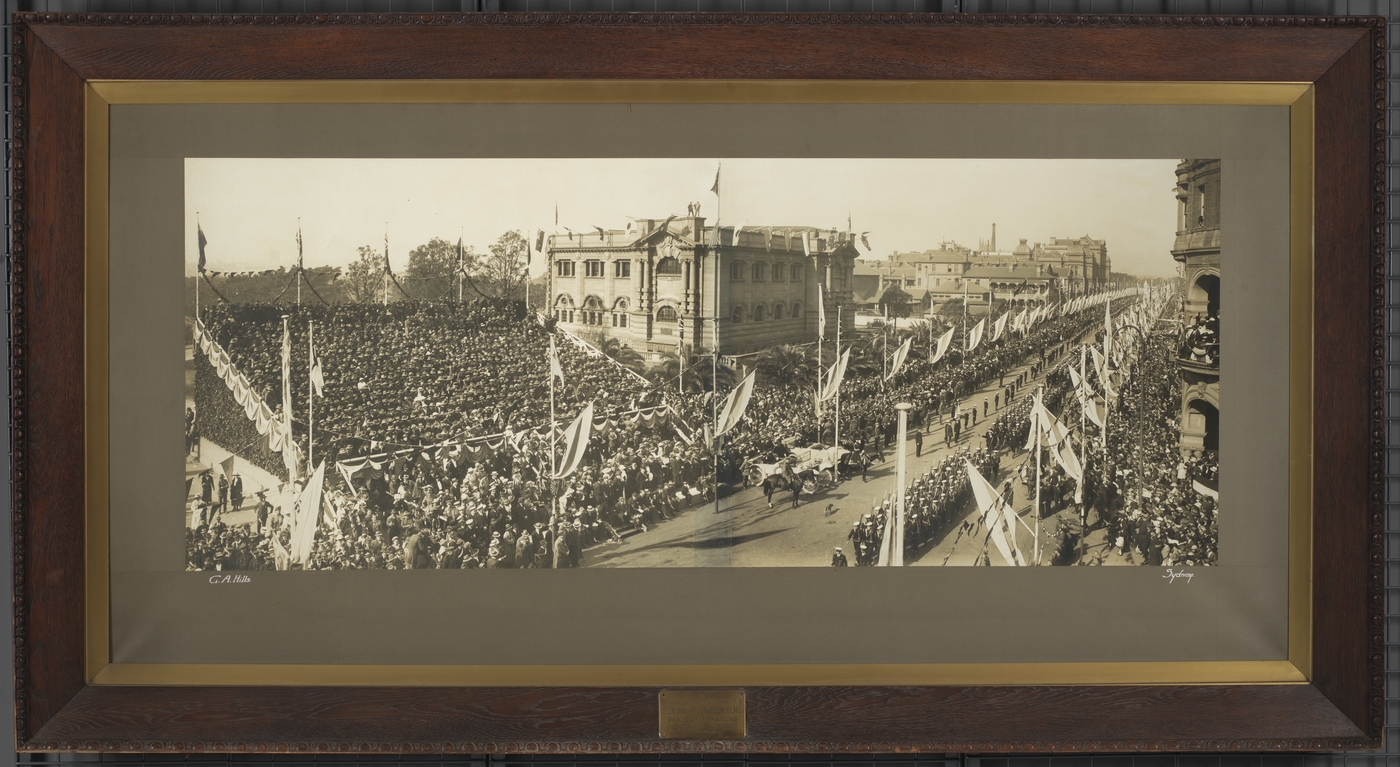‘Now that the war is over we realize what we’ve been through’
Jack Hutton, 25 November 1918, MLMSS 1138
To all concerned
Message from Gen Foch
Commander in Chief B.E.F reads
Hostilities will cease on the whole front on the 11th November at 11o’clock French time
The Allied troops will not cross until further order the line reached on that date at that time
Signed
FOCH
6:55am
Transcription of Message sent at 10.55am from 2nd Division HQ. This message from General Foch ordered cessation of hostilities at the time of the Armistice, 11 November 1918
For four years and three months, the Great War raged through Europe, the Middle East and the Pacific. For Australia, the First World War remains the costliest conflict in terms of deaths and casualties. From a population of fewer than five million, 416,809 men enlisted, more than 60,000 were killed and 156,000 were wounded, gassed, or taken prisoner (Australian War Memorial, First World War)
The negotiations to bring about the end the conflict began in the early hours of the 11th of November 1918. Allied Supreme Commander Ferdinand Foch lead discussions with the German delegation in a railway carriage in the forest of Compiegne, some 65km north-east of Paris.
The Armistice – agreeing to cease hostilities, was signed between Germany, France and Britain at 5 a.m. on the morning of 11 November. It came into effect six hours later at 11 a.m. The agreement was a prelude to the formal peace negotiations which would be signed six months later, ratified as the Treaty of Versailles.
Australian troops greeted the news with a combination of relief, joy and happy disbelief that four years of war, death and devastation was finally over.
False armistice
For days leading up to the 11th of November, rumours spread that peace had already broken out. There were a series of ‘false alarms’, which were briefly celebrated by troops in Europe, as well as in Australia.
Francis Brewer, a journalist from Brisbane was recuperating from injuries in an English hospital when rumours of an armistice started swirling;
joined in the mad rush to ask ascertain: "What news, Diggers?" In fact almost the whole hospital staff has raced off to the town of Dartford where some of the boys reported that "Free beer was flowing”. A new moon gleamed in the darkening evening sky. Will it shine on a peaceful world again? Tomorrow I shall know… The man selling the evening papers assures me an Armistice was signed at 2.30 PM today’
November 8th: - Alas last night's rejoicing was premature. The report of Armistice being signed yesterday was circulated by Reuter's Agency; later the same Agency contradicted the report as being untrue. But there is no mistaking the trend of events. The collapse of Germany is imminent … When shall the news come?
November 4th: - Armistice not yet signed, but the Kaiser has abdicated ...
Francis Brewer diary, MLMSS 1536/2
The 11th day of the 11th month
Stretcher-bearer Langford Colley-Priest wrote home to his parents in Sydney;
On Monday morning the 11th inst. at 5 a.m. the Armistice Terms were accepted by Germany & at 11 a.m. hostilities ceased for the first time in four years on the western front. Germany's acceptance of the Armistice Terms, really means unconditional surrender. The end of this awful slaughter and bloodshed is at hand, it seems too good to be true. What a great joy this latest news will bring back to the World. I can just imagine the people in Australia, nearly going crazy, with joy, when they heard of the news.’
Langford Colley-Priest, MLMSS 2439/Item 1
Jim Marshall, a young man from Coogee in Sydney observed excited French locals in the village he was billeted in a few days prior to the Armistice;
Nov 8/9th 1918 Monsieur! Monsieur! la guerre c’est finis!
Hullo, what has gone wrong with Madame now that she is so excited? Madame en la rue dit verite, "c’est finis!" and off she went, waddling up to the Mairie to obtain information on the subject. Surely something had happened for there were flocks of men and women in various stages of apoplexy, we thought, flocking along the usually quiet village street.
Well we had to job to do, war or no war, so had to carry on till the old dame returned with information to the effect that four emissaries from the German Govt were already on their way to sign an Armistice based on Wilson’s 14 points. So far as I know, none of us went mad but we were all strangely elated.
James Joseph Marshall narrative, MLMSS 1164/Item 4
Sister Anne Donnell from Adelaide had served as a nurse with the Third Australian General Hospital at Lemnos in Greece, treating many of the casualties from Gallipoli. She was then deployed to hospitals in England, then to a Casualty Clearing Station just behind the lines on the Western Front. Suffering from illness, she was moved to England where she recuperated and regained her health. By late 1918, she was working at Harefield hospital (a converted manor) outside London, treating sick and wounded Australian servicemen. Many patients were suffering from influenza and Anne had recently lost a close friend, another nursing sister to the ‘flu, as well as a number of dearly loved soldier patients;
for a fortnight we have had very sick Influenza patients in with the eye boys – It’s a terrible flu. The worst I have come in contact with. It starts with an ordinary cold – and if neglected some turn into a general aching with severe pains in the small of the back and at the back of the head – also great tenderness over the balls of the eyes – T – usually 103 to 105 - . Then almost without warning an acute Pneumonia sets in – which makes it hard to combat. We lost one of the dearest boys that way and so suddenly. Sergent Bradford from Murray Bridge –
The day the Armistice was signed, all those around her were excited and happy, but Anne was feeling melancholy; still grieving for lost friends;
The Kaiser has chucked his job & the war’s over.
Had an inoculation for Influenza & as per usual much against my will.November 11 Monday
The Armistice is signed - The guns went off at midday – There’s a certain amount of quiet excitement with most of us – some are overjoyed – I wish I could feel happy – but I’m terribly depressed - am thinking of Ross & Stewart - & how things have changed –

DICTATED PEACE. (1918, November 12). The Daily Telegraph (Sydney, NSW : 1883 - 1930), p. 5.
Harry Gissing, a member of the Australian Army Medical Corps painted a vivid picture of the celebrations in southern France;
caught the train back to Nice. Had dinner at Hotel and then went uptown to be in the celebrations. The Aussies, being tired of being taken for Yanks, lined up with an Australian flag and paraded the streets. They gave us a wonderful reception, Vive l'Australienne coming from all sides and we were pelted with confetti whilst some French buglers in front and half the population tailing up behind, we did the main thoroughfare singing Australia will be there. Dancing and kissing was the order of the night & I sought my couch at 1.30 A.M.
Henry Gissing diary, MLMSS 1845/Item 8
While in England, Archie Barwick reported;
the whole air as I write now is filled with screaming and howling whistles and sirens … the end has been so dramatic and the win so complete that we can hardly grasp the full meaning of it. When we got news of this the lads were on parade and the message came up telling of the signing of the armistice and the end of the war, the C.O. read it and proclaimed the day a general holiday amidst an outburst of cheering and the lads promptly scattered and made off for the town. The camp is now practically deserted but I have to stop here till dinner time for I am Depot Orderly.’
Barwick diary, MLMSS 1493/Box 3/Item 15
Jack Hutton wrote fondly of the French people he met during his war service and recorded in his diary the words spoken by the Mayor of Amiens after the Armistice was signed;
The French are admirable, I shall never forget them. They love the Aussies.
Spoken at an Aust Cemetry [sic] by the Mayor of Amiens:
“People of France you can never repay the debt you owe to Australia. All women should be as mothers, sisters, wives & sweethearts to the full by caring for their graves for all times”
Hutton diary, MLMSS 1138/Item 3
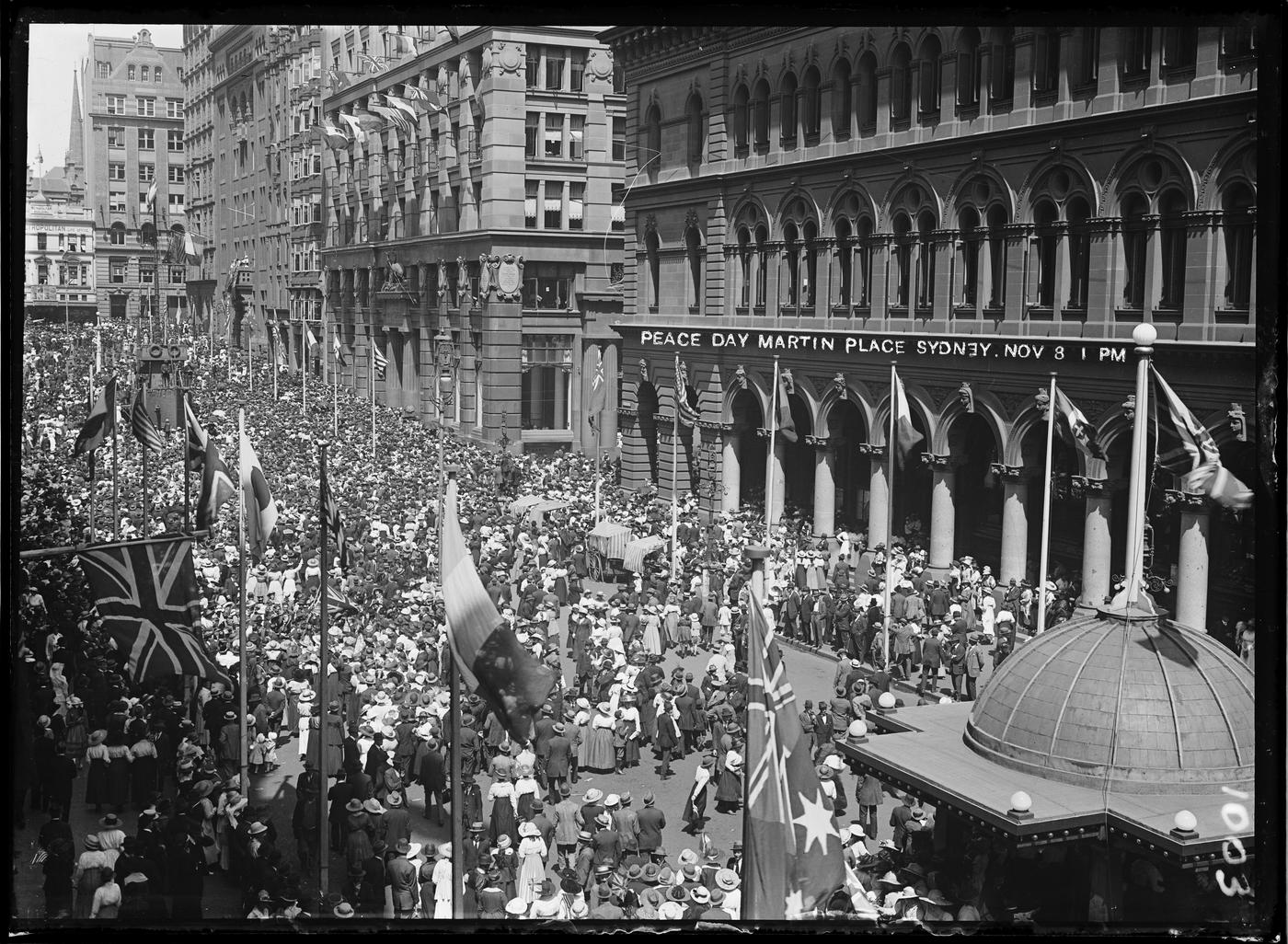

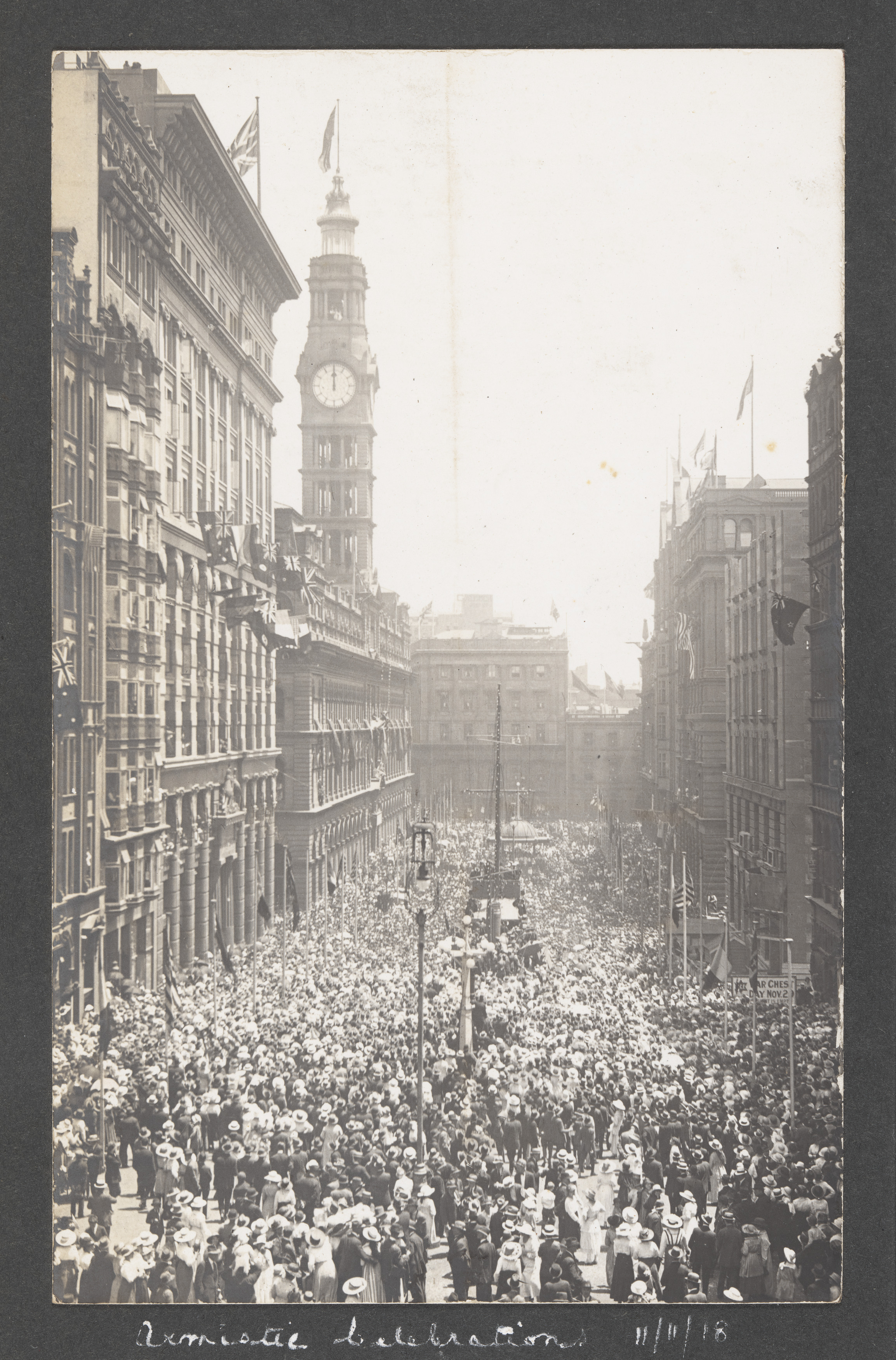
The Treaty of Versailles and Peace Day
The Treaty of Versailles was signed at the Palace of Versailles, outside Paris on 28 June 1919, formally ending the hostilities. Celebrations marking the official end to the war were held on Saturday 19 July, which was declared Peace Day throughout the British Empire.

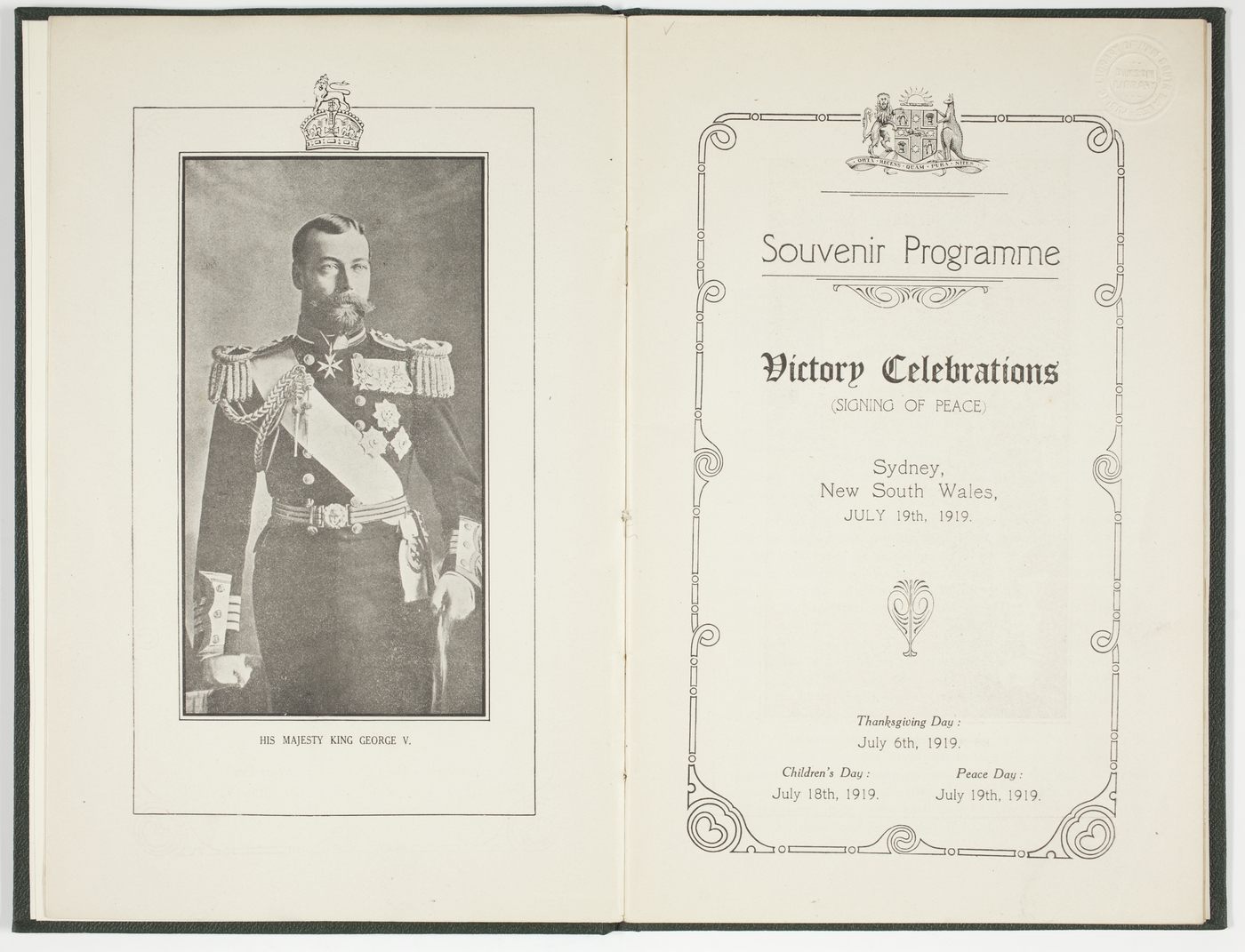
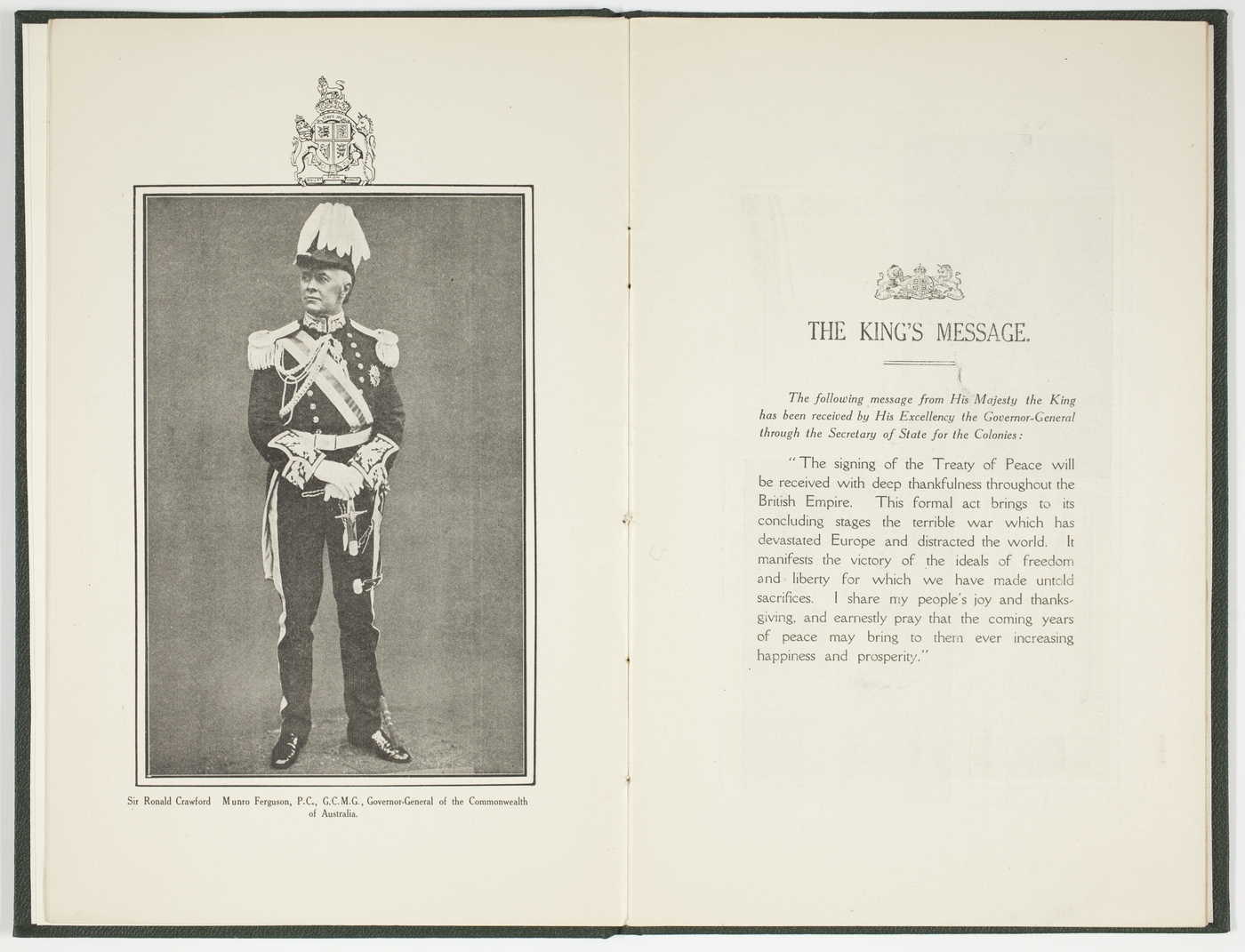
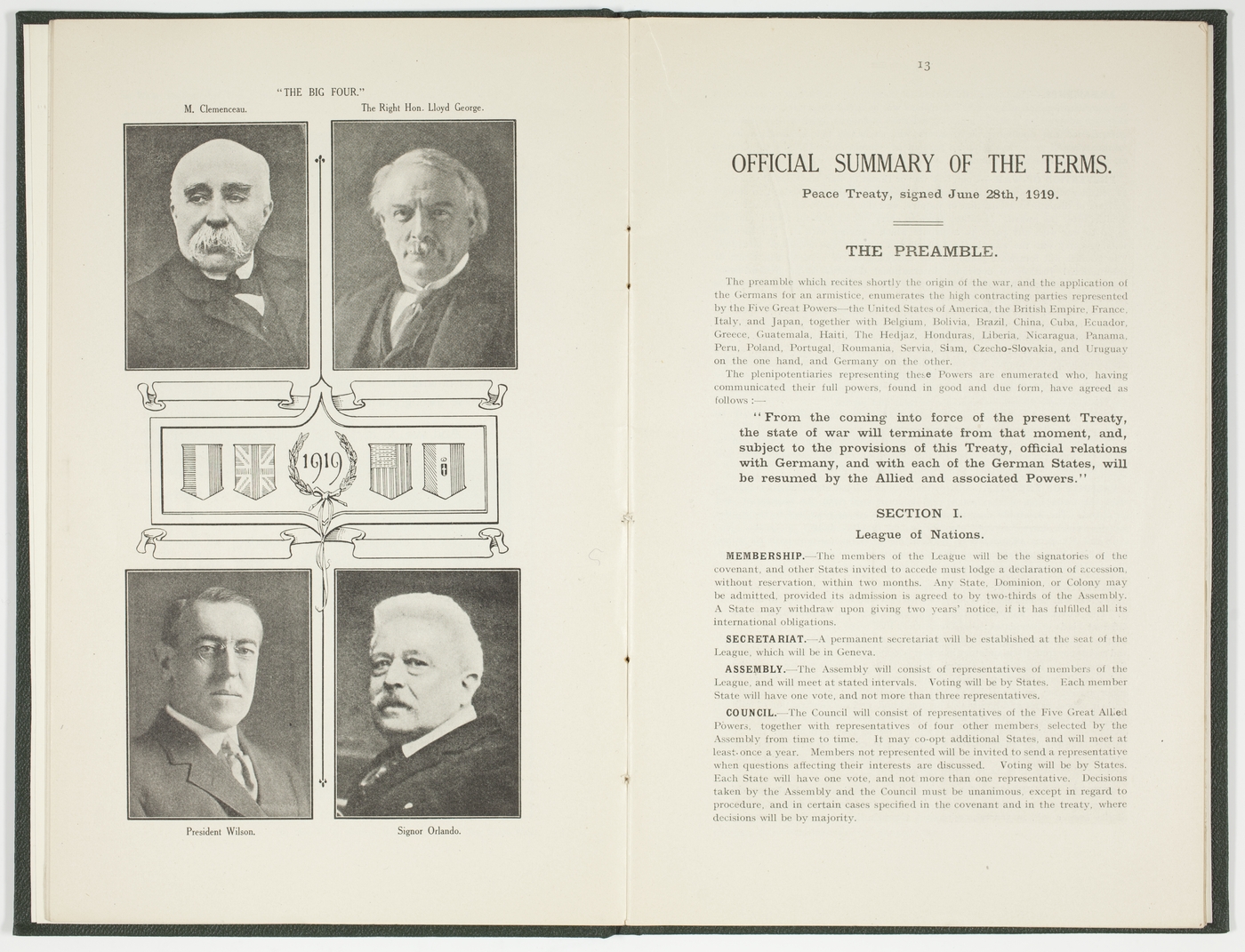
On Peace Day in Sydney, buildings were decorated, bells rung in churches and crowds of people travelled into the city to witness those who served march through the streets. This was intended to be a solemn occasion of reflection and grief. Unlike the uninhibited rejoicing of November 1918, Peace Day was a recognition of the sacrifice of death or disability amongst those who served.
More than 10,000 sailors and soldiers, Red Cross and other war workers marched through the city streets; a parade of people which stretched for almost 5 kilometres.
Macquarie Street was unofficially re-named for the day, the ‘Avenue of the Allies’ and was the ‘saluting base’ where dignitaries gathered and took the salute.
At 11.30 am the parade halted, the bands and choirs played and sang Kipling's 'Recessional', joined by many spectators, bugles sounded the 'Last Post' and three minutes of silence were observed across the city in commemoration of the fallen.
The press recorded the march and the ceremony held on Macquarie Street, which was documented by photographer, G.A. Hills.
‘At the Saluting base’
Never has Macquarie street presented a more brilliant appearance. Under the Winter sunshine, the blue and white streamers floating in the 'breeze from the tops of hundreds of Venetian masts, the festoons of evergreens, and the decorations of public buildings and private houses; made a wealth of color that will not soon be forgotten by those who saw them. On the grass plot facing Bent street, and rising high above Governor Bourke's Statue, a gaily-decorated stand, packed with the veterans from Bare Island, blind and maimed soldiers, and nursing sisters, made a fitting back-ground for the official stand … By this time e'ery inch of space behind the barriers on both lines of the street, was occupied, every window, was crowded and on every roof were gathered crowds of cheering spectators. Hardly had the last notes of the National Anthem died away … when cheering from Queen's Square end of the street announced that the procession was on its way. The cheering broke into a roar of welcome as the head of the procession, formed of representatives of the Allies — America, France, Belgium, Japan and Servia — bearing aloft the flags of their respective countries, marched abreast in national costume.
‘At the Saluting base’, Sunday 20 Jul 1919, Sunday Times, page 2
References
Featured article: The Armistice, http://www.firstworldwar.com/features/armistice.htm, accessed 17/09/2018
First World War, The Australian War Memorial, https://www.awm.gov.au/articles/atwar/first-world-war
‘My story of the big war’, James Joseph Marshall narrative, 24 November-12 December 1916, MLMSS 1164/Item 4 http://archival.sl.nsw.gov.au/Details/archive/110349290
Francis Brewer war diary, 7 October 1918-16 April 1919, MLMSS 1536/2 http://archival.sl.nsw.gov.au/Details/archive/110368331
The Daily Telegraph (Sydney, NSW: 1883 - 1930), 12 November 1918, p. 5, http://nla.gov.au/nla.news-page25785056 accessed 31/08/2018
Langford Colley-Priest, MLMSS 2439/Item 1 http://archival.sl.nsw.gov.au/Details/archive/110339801
Anne Donnell diary, 29 December 1917 - 31 January 1919, MLMSS 1022/Item 2
http://archival.sl.nsw.gov.au/Details/archive/110336116
H. E. Gissing diary, 8 August 1918-16 November 1918, MLMSS 1845/Item 8
http://archival.sl.nsw.gov.au/Details/archive/110337250
Archie Barwick diary, 1 October-14 December 1918, MLMSS 1493/Box 3/Item 15
http://archival.sl.nsw.gov.au/Details/archive/110336745
John Thomas Hutton war diary, 1 January 1918-31 December 1918, MLMSS 1138/Item 3 http://archival.sl.nsw.gov.au/Details/archive/110338346
‘Celebrating the end of World War I’, by Neil Radford, Dictionary of Sydney, https://dictionaryofsydney.org/entry/celebrating_the_end_of_world_war_i, accessed 14/09/2018
‘At the Saluting base’, Sunday 20 Jul 1919, Sunday Times, p.2 http://nla.gov.au/nla.news-article123224556



